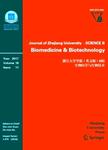Antepenultimate residue at the C-terminus of NADPH oxidase RBOHD is critical for its function in the production of reactive oxygen species in Arabidopsis
拟南芥NADPH氧化酶RBOHD羧基端倒数第三位氨基酸在其介导活性氧迸发中的重要作用(英文)作者机构:Ministry of Agriculture Key Lab of Molecular Biology of Crop Pathogens and InsectsCollege of Agriculture and BiotechnologyZhejiang University
出 版 物:《Journal of Zhejiang University-Science B(Biomedicine & Biotechnology)》 (浙江大学学报(英文版)B辑(生物医学与生物技术))
年 卷 期:2019年第20卷第9期
页 面:713-729页
核心收录:
学科分类:0710[理学-生物学] 1007[医学-药学(可授医学、理学学位)] 071001[理学-植物学] 1004[医学-公共卫生与预防医学(可授医学、理学学位)] 1001[医学-基础医学(可授医学、理学学位)] 07[理学] 0905[农学-畜牧学] 0906[农学-兽医学]
基 金:the National Natural Science Foundation of China(No.31622006) the Postdoctoral Science Foundation of China(Nos.2018M630683 and 2018T110601)
主 题:Reactive oxygen species(ROS) NADPH oxidase(NOX) Microbe associated molecular pattern(MAMP) Lipopolysaccharides(LPS) Respiratory burst oxidase homolog D(RBOHD)
摘 要:Production of reactive oxygen species(ROS)is a conserved immune response primarily mediated by NADPH oxidases(NOXs),also known in plants as respiratory burst oxidase homologs(RBOHs).Most microbe-associated molecular patterns(MAMPs)trigger a very fast and transient ROS burst in ***,recently,we found that lipopolysaccharides(LPS),a typical bacterial MAMP,triggered a biphasic ROS *** this study,we isolated mutants defective in LPS-triggered biphasic ROS burst(delt)in Arabidopsis,and cloned the DELT1 gene that was shown to encode *** the delt1-2 allele,the antepenultimate residue,glutamic acid(E919),at the C-terminus of RBOHD was mutated to lysine(K).E919 is a highly conserved residue in NADPH oxidases,and a mutation of the corresponding residue E568 in human NOX2 has been reported to be one of the causes of chronic granulomatous ***,we found that residue E919 was indispensable for RBOHD function in the MAMP-induced ROS burst and stomatal *** has been suggested that the mutation of this residue in other NADPH oxidases impairs the protein’s stability and complex ***,we found that the E919K mutation did not affect RBOHD protein abundance or the ability of protein association,suggesting that the residue E919 in RBOHD might have a regulatory mechanism different from that of other *** together,our results confirm that the antepenultimate residue E is critical for NADPH oxidases and provide a new insight into the regulatory mechanisms of RBOHD.



